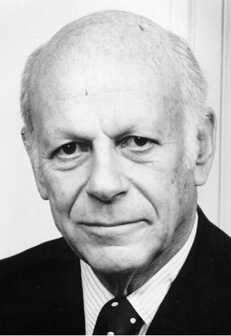Voices of Stone and Steel – William Schuman

Photo by Carl Mydans
During the 1960s William Schuman was considered “probably the most powerful figure in the world of art music” and “the most important musical administrator of the 20th century,” according to the New York Times. He was also one of America’s most highly regarded composers throughout the middle third of the century. The story of his rapid ascent to a position of such eminence was legendary during his lifetime: He was an “all-American boy,” born in New York City, who spent his childhood consumed with baseball. He later formed a dance band, for which he wrote a host of popular songs, many of them with lyrics by his friend Frank Loesser. Classical music meant nothing to him until, at the age of twenty, he was dragged reluctantly by his sister to hear Toscanini conduct the New York Philharmonic. The sound and appearance of the symphony orchestra was a revelation to him: The next day he dropped out of business school, and decided then and there to become a composer. Amazingly, nine years later his Symphony No. 2 was performed by Koussevitzky and the Boston Symphony.
At the age of 35 he became president of the famed Juilliard School, revamping the entire faculty and curriculum; seventeen years later he became president of the brand-new Lincoln Center for the Performing Arts, shaping it into a world-famous institution that influenced all performing arts centers to follow.
However, by the 1960s Schuman’s reputation as an administrator had overshadowed his importance as a composer. To the younger generation this erstwhile exponent of musical Modernism had become the very embodiment of the musical Establishment. And although his music continued to increase in complexity, his refusal to embrace the serial approach to composition set him apart from the vanguard. “It was a different environment,” noted Joseph Polisi, Schuman’s biographer. “Although it didn’t make any sense I think it was perceived in the later ‘50s, the ‘60s, and the ‘70s, that there was an intellectual rigor to serialism [that was missing from] tonal music …” “If you didn’t write using that technique, you were perceived as old-fashioned or intellectually barren or questionable in terms of your motives.” Schuman’s stature as a composer has never really recovered from that period of eclipse. While he never became a proponent of serialism, much of his music was quite dissonant, thereby alienating both the academic avant-garde and also more conservative general listeners. Although he completed ten symphonies, two operas, and numerous choral, orchestral, and chamber works, most of which had been performed and recorded by the world’s leading soloists, conductors, and ensembles, by the time he died in 1992, little of that music was performed with any regularity. And during the years since then his reputation as a composer has rested chiefly on three pieces, two of them based on material by other composers. (from Voices of Stone and Steel, pp. 23-24).